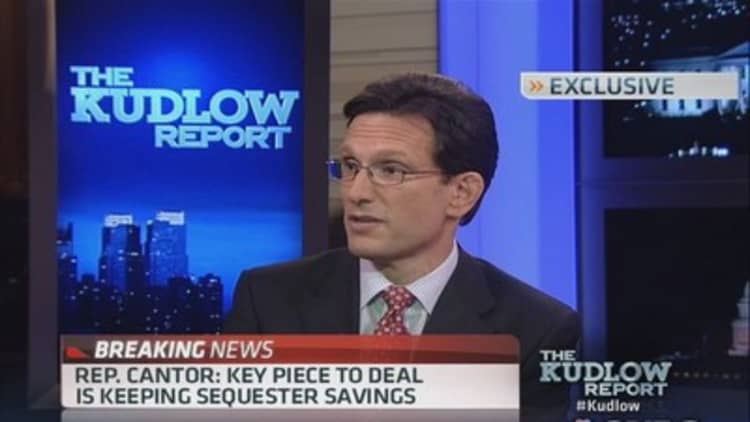
With a December 13th deadline looming large, House-Senate bipartisan budget negotiators reached a modest budget agreement early Tuesday evening that will replace tens of billions of dollars in spending cuts with longer-term savings and revenue.
Following weeks of secret meetings, House and Senate Budget Committee Chairs, Rep. Paul Ryan (R-WI) and Sen. Patty Murray (D-WA) publically announced their compromise, which would restore about $63 billion in automatic sequester spending cuts over two years, split evenly between defense and non-defense programs.
(Read more: Lawmakers announce compromise budget deal)
During an exclusive interview with CNBC Tuesday night, House Majority Leader Eric Cantor said GOP leadership supports the budget progress.
"The important piece to this deal, and, yes, it is a modest deal, is we maintain the savings of the sequester," Rep. Eric Cantor told 'The Kudlow Report.'
"What we've always said was we need the savings in the mandatory, the entitlement, the autopilot spending arena. The savings that are inside this budget deal really are primarily derived from reforms to the pension benefits for federal employees. This is the federal government finally trying to do what most responsible states are doing and dealing with their unfunded liabilities connected with their pensions."
The Ryan-Murray bargain would offset a reduction in sequester cuts by a variety of spending reductions and increased fees elsewhere in the budget totaling about $85 billion over a decade, which Cantor conceded is not exactly what Republicans wanted.
"There are no tax increases in this package… Would I rather have seen a deal without fee increases? Yes." the Virginia Republican told Larry Kudlow. "But we're in divided government right now and obviously very frustrating that we can't get everything that we want."
(Read more: DC squabbling could still wreck the economy in 2014)
The budget compromise announced Tuesday evening would provide a largely symbolic cut of more than $20 billion in the nation's $17 trillion debt, and has already attracted some opposition from conservatives seeking to preserve spending cuts and deficit reduction. Senator Marco Rubio (R-FL) issued a statement saying he would oppose the House-Senate budget deal and conservative interest groups like Heritage Action and Americans for Prosperity are urging Republicans to oppose it too.
Some liberal groups have also expressed opposition to the deal, because it requires federal workers to contribute more to their pensions and because the plan doesn't include an extension of benefits for workers unemployed longer than 26 weeks. The program expires on Dec. 28, when payments will be cut off for an estimated 1.3 million individuals.
"The president has not come forward with a serious plan of unemployment insurance," Cantor said. "In the House, we remain focused on how you grow the economy. How do you get the unemployed back to work. That is our focus in the House, trying to afford more opportunity about promoting growth because as we know, upward mobility can only come from a growing economy."
House Budget Chairman Paul Ryan will brief the House Republican conference during their weekly meeting Wednesday morning, and the House could vote on the legislation as soon as Thursday. Given the internal House GOP divisions, Speaker Boehner is likely to need Democratic votes to approve any deal, but bipartisan approval of the Ryan-Murray budget compromise is expected in both houses in the next several days.
(Read more: Obama aide: Help long-term unemployed)
The White House issued a statement from President Barack Obama Tuesday night praising the deal as a "good first step" and Leader Cantor said it builds on Republican commitments to reduce spending.
"Our position has also always been that across the board, indiscriminate cuts were not as good as mandatory cuts, if we could achieve those… This deal allows us an even better path forward, as it maintains the (sequester) savings but places those savings in areas that are much smarter," Cantor said. "So we can go about the business of reassuming our role in setting budget priorities and continuing to ratchet down the wasteful spending here in Washington."
— AP contributed to this report
— By CNBC's Ben Thompson. Follow him on Twitter @BenThompson00

